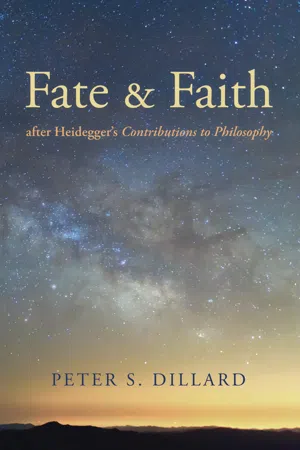![]()
Chapter 1
The Seeds of a Conflict
A Picture and a Puzzle
We begin by recalling the basic picture of the relationship between theology and philosophy that Heidegger presents in his 1927 Marburg lecture “Phenomenology and Theology.” Theology is an ontic science that takes a specific being—Christ, the crucified God, who is revealed through faith—as its topic. The methodology of theology is to bring greater transparency to faith in the crucified God through a conceptual interpretation that renders faith more rather than less difficult. Philosophy, on the other hand, is the ontological science that investigates the nature of being per se. The kind of philosophy Heidegger has in primarily mind is phenomenology, the methodology of which is the careful and accurate description of the manifold phenomena we experience with an eye to elucidating the fundamental phenomenon of being itself. Despite their thematic and methodological differences, and despite the fact that philosophy does not require any assistance from faith, Heidegger urges that philosophy can assist theology by clarifying ontological concepts the latter discipline takes for granted.
Immediately, Heidegger’s insistence in the same lecture that faith is the mortal enemy of philosophy seems to call the foregoing picture into question. If faith is incompatible with philosophy, and if theology is nothing other than self-reflective faith seeking greater and more challenging transparency, then it appears to follow that theology is also incompatible with philosophy. But then prima facie it is puzzling how philosophy could contribute anything to theology rather than undermine it, since to philosophize is presumably to abandon the faith that is essential to theology yet irreconcilable with philosophy.
The force of the puzzle turns on the answers to the following questions. Is there really a conflict between phenomenological philosophy and faith in the crucified God? If so, then what sort of conflict is it? Does the conflict in question constitute a genuine incompatibility that precludes theology informed by faith from consistently accepting any phenomenological clarification of ontological concepts presupposed in theology? As will become evident below, one sort of conflict between faith and philosophy does not prevent philosophy from contributing to theology. Moreover, there is a way of construing phenomenology that leads to no conflict whatsoever between phenomenological philosophy and faith. Perhaps for these reasons, then, it is understandable how Heidegger in 1927 can speak favorably of “the possibility of a community of the sciences of theology and philosophy.” It is only when philosophy is identified with the distinctive existential phenomenology set forth in Sein und Zeit that an apparently insurmountable incompatibility arises between philosophy and faith that prevents any community or peaceful coexistence between philosophy and theology. We must pinpoint the source of this incompatibility in order to lay the groundwork for the analyses to be undertaken in subsequent chapters.
Clashing Attitudes and “Ontology”
One kind of conflict between philosophy and theology that is grounded in faith arises from the differing human attitudes towards life or, as Heidegger terms them, “forms of existence,” associated with these respective disciplines. A person who is committed to the philosophical form of existence exemplified by Socrates strives to live in such a way that he refuses to accept any belief unless it is either self-evident, logically deducible from self-evident beliefs, directly confirmed by experience, or perhaps part of a predictively successful scientific theory. A phenomenological philosopher may be particularly keen to base her results solely upon what is experientially available to us. On the other hand, a person who is committed to a faithful and, by extension, theological form of existence is willing to accept some beliefs as true based solely on the authority of scriptural revelation, perhaps mediated by sacred tradition.
The philosophical/phenomenological and faithful/theological attitudes toward life are certainly incompatible, since no one can adopt both of them simultaneously. Nevertheless, this clash of attitudes does not automatically preclude the philosopher from clarifying concepts employed by the theologian. To take a mundane example, the theologian who believes on faith that Jesus walked on water (Matt 14:22–33; Mark 6:45–51; John 6:16–21) takes for granted the concept of linear motion, since for Jesus to walk from the shore to the disciples out in the boat requires him to be capable of moving in a line from one point to another. Without sharing the theologian’s belief that Jesus walked on water, the philosopher could still provide “co-direction” by defending the possibility of linear motion against, say, Zeno’s paradoxes. Or to take a more phenomenological example, the philosopher could carefully describe how different kinds of beings featured in this scriptural episode—things of nature like the wind and the waves, tools like boat with its sails and oars, and human beings—are given to us in experience without professing any belief in the miracle of Jesus’s walking on water.
Another kind of conflict that might arise between philosophy and theology is not just a difference in attitude toward life but a substantive ontological disagreement either about beings or about the nature of being itself. Allowing philosophy to “co-direct” theology in ontological matters without also allowing theology to scrutinize philosophy’s own ontological assumptions then comes across as objectionably lopsided. S. J. McGrath, who crisply articulates this objection, goes so far as to say that the Heidegger of “Phenomenology and Theology” is not “a facilitator of authentic theology, but rather something of a theological terrorist.” McGrath explains:
